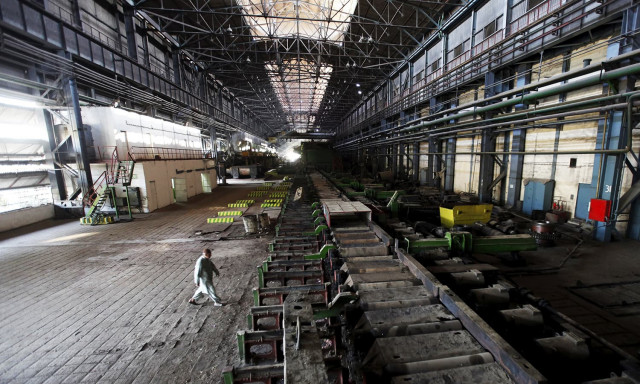Public-private partnership can save PSM
Experts urge government to protect rights of workers

Once the producer of almost half the country’s steel needs, the state-owned Pakistan Steel Mills’ (PSM) is now a disputed issue that can be solved if the government and the workers examine the probability of a public-private partnership.
These views were shared by Economist Dr Kaiser Bengali while speaking at a consultative session on the privatisation of public sector enterprises, which was organised by the Pakistan Institute of Labour Education and Research (PILER) on Saturday at the Arts Council.
“The feasibility report of PSM, which was drafted during the 1960s, had no condition for the state-owned mill to earn a profit,” said Bengali, adding that it was formed for further development of engineering industries and to create job opportunities.
“However, because of the inefficiency of the management, the government decided to privatise the steel mill ignoring the millions of workers and labours.”
The economist suggested that the labour unions should now pitch the government the idea of selling the steel mill in a public-private partnership.
“This may reduce job opportunities initially, but will later on balance the requirement when new engineering industries will be established.”
Bengali stressed the need to have an analysis of the profit and loss account and balance sheet. “We need to first identify the fixed assets, before presenting an argument in front of the government.”
Also speaking on the occasion, Supreme Court Advocate Faisal Siddiqui said, “It is an unrealistic demand to stop the privatisation process. The decision has been taken, we should now decide what should be the way forward.”
Underlining the need for strong mobilisation of workers against privatisation, the advocate said workers should find a way through which the government protects their rights in the long-run despite the privatisation of PSM.
Shedding light on the aftereffects of the privatisation, PILER Director Karamat Ali said that the government’s decision to privatise state-owned entities will affect the overall economy of Pakistan drastically. Ali emphasised that to achieve fruitful results, workers, trade unions, and all other employees should stand united.
Endorsing the views of other experts, Economist Dr Asad Sayeed suggested that the government should provide social protection or unemployment allowance to those workers who are laid-off.
He maintained that workers of public sector enterprises should be retrained. “An interim system regarding social protection should be put in place to resolve the economic challenges faced by the workers.”
Sayeed said unemployment compensation and re-training should be initiated by the government.
Former economist Dr Pervaiz Tahir was of the view that such a drastic decision during the already tough pandemic situation will harm the economy. “The government laid-off thousands of workers and more are being rendered unemployed, such type of privatisation during a pandemic is harmful to the society and economy.”
Suggesting a completely different approach, Tahir said a public-private-workers participation model should be developed to run PSM. However, this plan can only be implemented if the workers can partially run the previously owned steel mill.
Published in The Express Tribune, March 7th, 2021.
Like Business on Facebook, follow @TribuneBiz on Twitter to stay informed and join in the conversation.



















COMMENTS
Comments are moderated and generally will be posted if they are on-topic and not abusive.
For more information, please see our Comments FAQ